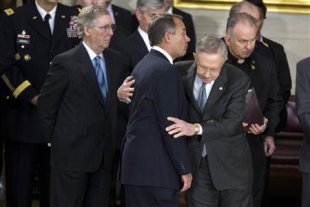NAIROBI, Kenya (AP) — The director of the Pumwani Maternity Hospital, located in a hardscrabble neighborhood of downtown Nairobi, freely acknowledges what he's accused of: detaining mothers who can't pay their bills. Lazarus Omondi says it's the only way he can keep his medical center running.
Two mothers who live in a mud-wall and tin-roof slum a short walk from the maternity hospital, which is affiliated with the Nairobi City Council, told The Associated Press that Pumwani wouldn't let them leave after delivering their babies. The bills the mothers couldn't afford were $60 and $160. Guards would beat mothers with sticks who tried to leave without paying, one of the women said.
Now, a New York-based group has filed a lawsuit on the women's behalf in hopes of forcing Pumwani to stop the practice, a practice Omondi is candid about.
"We hold you and squeeze you until we get what we can get. We must be self-sufficient," Omondi said in an interview in his hospital office. "The hospital must get money to pay electricity, to pay water. We must pay our doctors and our workers."
"They stay there until they pay. They must pay," he said of the 350 mothers who give birth each week on average. "If you don't pay the hospital will collapse."
The Center for Reproductive Rights, which filed the suit this month in the High Court of Kenya, says detaining women for not paying is illegal. Pumwani is associated with the Nairobi City Council, one reason it might be able to get away with such practices, and the patients are among Nairobi's poorest with hardly anyone to stand up for them.
Maimouna Awuor was an impoverished mother of four when she was to give birth to her fifth in October 2010. Like many who live in Nairobi's slums, Awuor performs odd jobs in the hopes of earning enough money to feed her kids that day. Awuor, who is named in the lawsuit, says she had saved $12 and hoped to go to a lower-cost clinic but was turned away and sent to Pumwani. After giving birth, she couldn't pay the $60 bill, and was held with what she believes was about 60 other women and their infants.
"We were sleeping three to a bed, sometimes four," she said. "They abuse you, they call you names," she said of the hospital staff.
She said saw some women tried to flee but they were beaten by the guards and turned back. While her husband worked at a faraway refugee camp, Awuor's 9-year-old daughter took care of her siblings. A friend helped feed them, she said, while the children stayed in the family's 50-square-foot shack, where rent is $18 a month. She says she was released after 20 days after Nairobi's mayor paid her bill. Politicians in Kenya in general are expected to give out money and get a budget to do so.
A second mother named in the lawsuit, Margaret Anyoso, says she was locked up in Pumwani for six days in 2010 because she could not pay her $160 bill. Her pregnancy was complicated by a punctured bladder and heavy bleeding.
"I did not see my child until the sixth day after the surgery. The hospital staff were keeping her away from me and it was only when I caused a scene that they brought her to me," said Anyoso, a vegetable seller and a single mother with five children who makes $5 on a good day.
Anyoso said she didn't have clothes for her child so she wrapped her in a blood-stained blouse. She was released after relatives paid the bill.
One woman says she was detained for nine months and was released only after going on a hunger strike. The Center for Reproductive Rights says other hospitals also detain non-paying patients.
Judy Okal, the acting Africa director for the Center for Reproductive Rights, said her group filed the lawsuit so all Kenyan women, regardless of socio-economic status, are able to receive health care without fear of imprisonment. The hospital, the attorney general, the City Council of Nairobi and two government ministries are named in the suit.
___
Associated Press reporter Tom Odula contributed to this report.











